Can Service Entrance Cable Be Just Attach Right To The Side Of The House
1 / 12
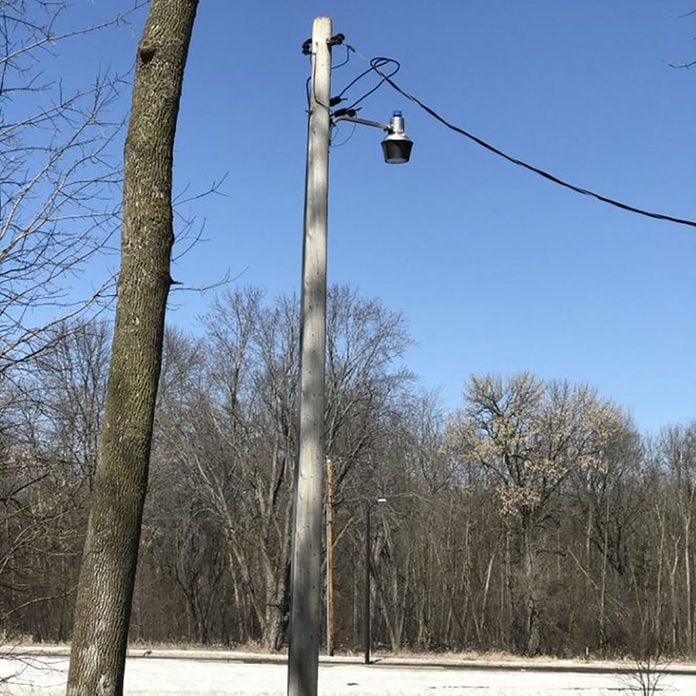
The Service D rop
The overhead service drop , or surreptitious service lateral, are the electrical conductors that come from the utility pole , pedestal or ground-mounted transformer to the home. Changes to the service drop will always be completed by the utility company , and the toll for most changes are the responsibility of the customer. The major prophylactic issue here is that the service drop conductors accept no fuse , circuit breaker or whatsoever kind of overcurrent protection at their supply finish ; they are dir ectly continued to the utility ' due south distribution grid and are energized at all times .
There are three conductors coming to the service mast in the overhead service drib , 2 ungrounded conductors ( hot legs ) and a separate grounded conductor ( neutral ) . The hot legs have black thermoset, polymer or other nonmetallic usher insulat ion . If all iii wires are connected to the service mast that runs through the roof , and/or downwards the outside wall of the business firm in a service-entrance conduit , you tin usually assume there is 2 4 0 – volt service for the house since each hot leg measures 120 – volts from each hot leg to the neutral .
2 / 12
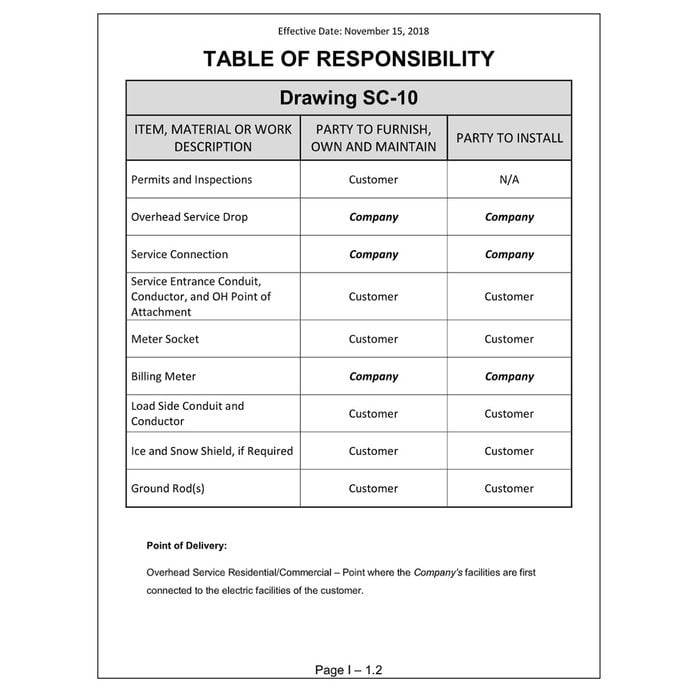
Who Owns What?
Power line regulations and responsibilities will vary from ane municipality to some other and will depend on whether a ability line is public or private. Public lines are installed and owned past a public utility visitor. Sometimes they are on public property, only sometimes they are on private belongings. Utility companies ain everything up to the service point, the point of connectedness between the serving utility and the house premises wiring system , and the service point is often on private belongings . Different utility companies define where that service signal is exactly located , and information technology can vary greatly depending on whether the electrical service is overhead or clandestine, the size of the electrical service rated in amperes, where information technology originates at the utility equipment, and where it terminates at the customer'due south equipment . Private ly owned electric distribution lines are sometimes plant in gated communities, apartment complexes, mobile dwelling and RV parks, college campuses, large industrial facilities and elsewhere.
So if a tree does fall on a mast or service drop, the chart in a higher place volition give you lot an idea who is responsible for what, but it ultimately depends on where you live and which utility company services y'all.
iii / 12
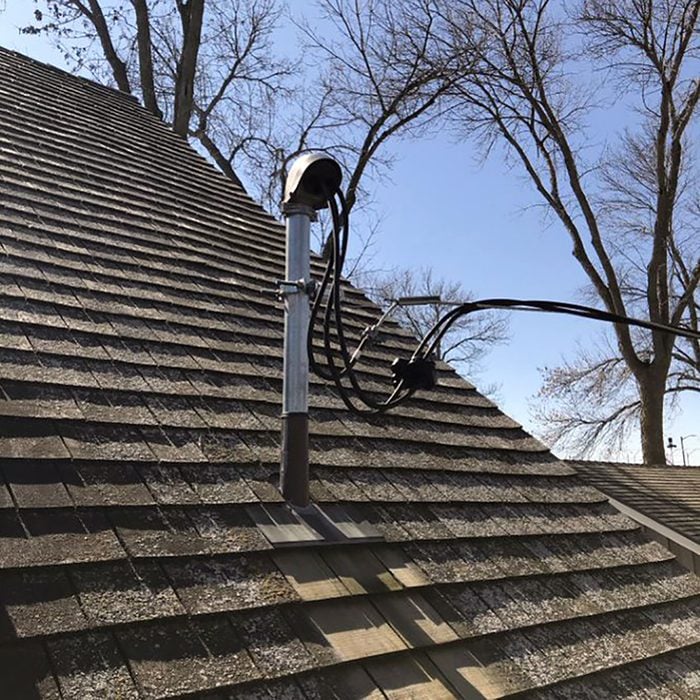
The Mast Has 1 Purpose
For safe reasons, d o not attach tv set, telephone, cablevision or other wires to the service mast. Only the electric util ity conductors are permitted to be attached to the service mast.
4 / 12

Avoid Trees
Be sure the overhead service drop conductors are gratis and clear of copse, limbs, droppings and vegetation. T rees that grow up into service conductors can damage the conductors and attract lightning strikes , both of which cause many ability outages every yr. Remember, a 4-f oo t tall, 2 -f oot wide tree might abound to be lx -anxiety tall and 30 -anxiety wide. Some utility companies have instituted tree replacement programs to assist customers in properly planting the correct copse in the correct identify to avoid future problems . For information about growth potential and planting most power lines, c ontact your utility company, your County Extension office, State'southward Department of Agriculture office, District Forester, or local nursery.
five / 12
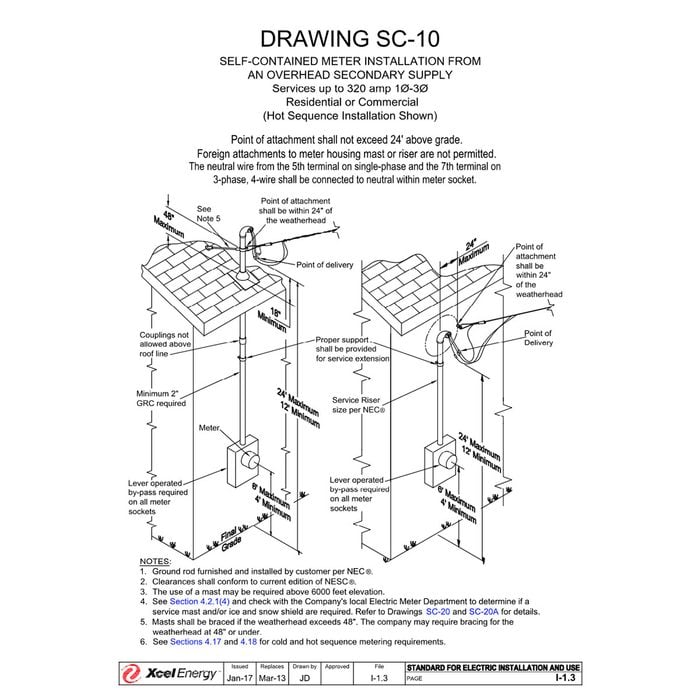
C learances for Service Drops
- Except at the drip loop, at northward o time less than 12-anxiety above final grade
- Where overhead service drop conductors terminate at a through-the-roof raceway or mast, there is a chiliad aximum of 6 -feet of usher length over the roof
- A m inimum of 18 – inches of clearance above any part of a sloped roof
- The service mast must be no more than 4 -feet from the edge of the roof measuring horizontally
- The service mast should not be more than than 3-f eet vertically above the roof line ; most utilities will require bracing or guy wires for additional support of any mast that is taller than 3-feet.
- Flat roofs need to have at least 8-feet of clearance and balconies demand at to the lowest degree ten -feet of clearance
- O verhead conductors must have a horizontal clearance of 3-feet from all windows that tin can be opened, doors, porches, balconies, ladders, stairs, burn down escapes, or like locations. No one should exist able to catch a service conductor from these areas .
six / 12

Additional C learances for Overhead Service D rop Conductors
- W hen located nigh a pond puddle, the overhead service conductors must be at to the lowest degree x -anxiety away from the puddle horizontally and at least 22 .5 -feet high .
- If the home has a flat roof, in that location must exist 8 -feet of clearance , and if your dwelling has a pitch roof of iv – inches in 12-inches , or greater , there must exist a minimum of 3 -feet of clearance .
- W hen the voltage to footing does not exceed 150 -volts , there must be 10 -feet of clearance from the lowest point of the baste loop at the electric service archway to buildings and the finished grade, w alkways , decks, patios, etc. The clearance is raised to 12 -feet where the voltage does non exceed 300 volts to ground , and raised to15 -feet where the voltage to ground exceed s 300 volts.
- T here must be an 18 -f oot clearance over public streets, alleys, roads, parking areas that may have truck traffic, driveways other than on residential property, and areas used by farming and construction vehicles .
vii / 12
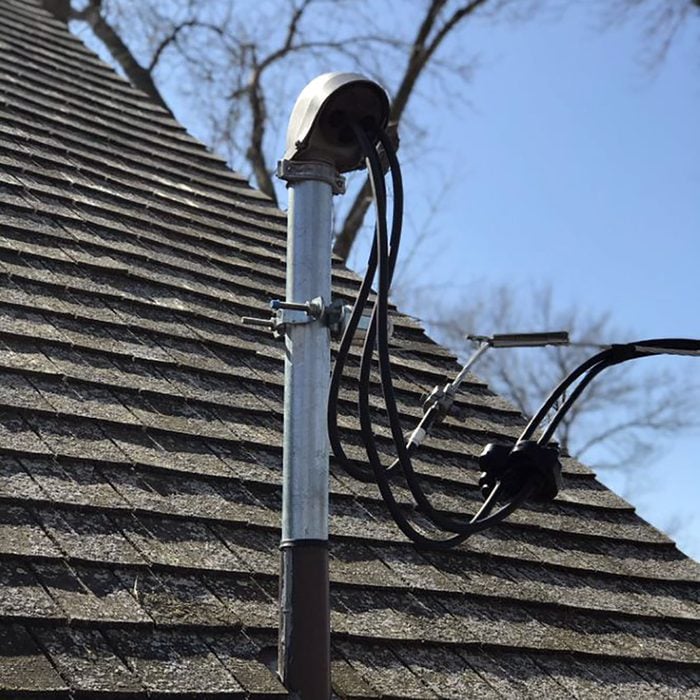
Service Drop Baste Loop
The overhead service driblet conductors are spliced to the service-archway conductors at the home. This connection is chosen the baste loop . The drip loop is required to keep h2o from traveling along the length of the service-entrance conductors and entering the service-entrance conduit at the weatherhead . Overhead service-archway conductors are attached to service masts with clench-on porcelain or similar nonmetallic insulators. Overhead service-entrance conductors that stop at the side of a house, under a roof eave , or on the roof fascia board are attached to screw-in porcelain or similar nonmetallic insulators.
8 / 12
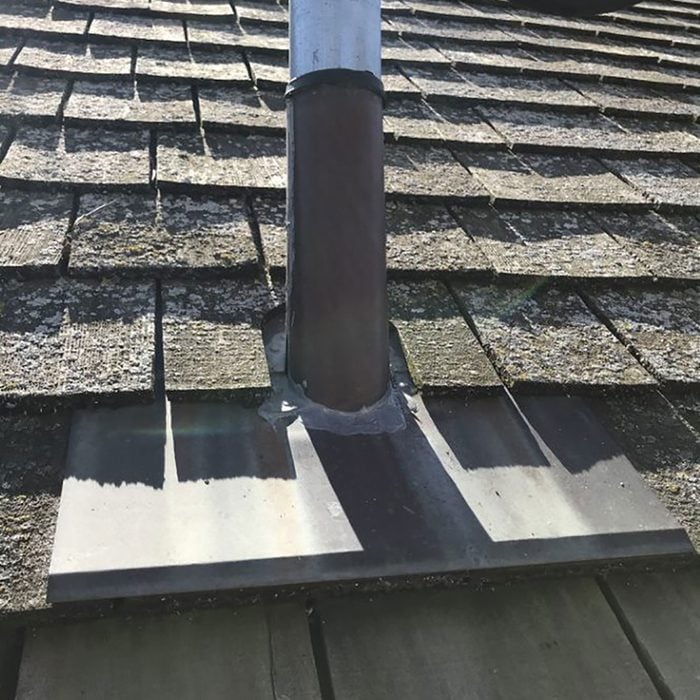
Flashing
Service masts that penetra te the roof must have a roofing boot properly secured at the roof line to prevent h2o leaks. The roofing boot must be properly sealed, glued and screwed flush with the roof membrane. If nails are used, they must be sealed properly. Nails can corrode over time and the membrane can dissever so be sure to use the correct tools for the job and have the time to be certain it is properly sealed. Mast brac ing must also exist sealed with flashing at the roof line intersection.
9 / 12

Supporting a mast higher up the roof
The typical service mast consists of 2-inch rigid metal conduit . Sometimes you 'll see a through -the-roof service mast that appears to be leaning from tension in the overhead service drib conductors . This tin be repaired past calculation a brace , tie back or guy-wire supports. Masts over 36- inches ordinarily require a mast brace or tie – back supports such as a No. 6 Copperweld Aircraft Cable ; although some municipalities permit the mast to exist as much equally v -feet in a higher place the roof line earlier needing a guy wire for extra back up . The caryatid must be installed at a minimum 45-deg ree angle.
10 / 12
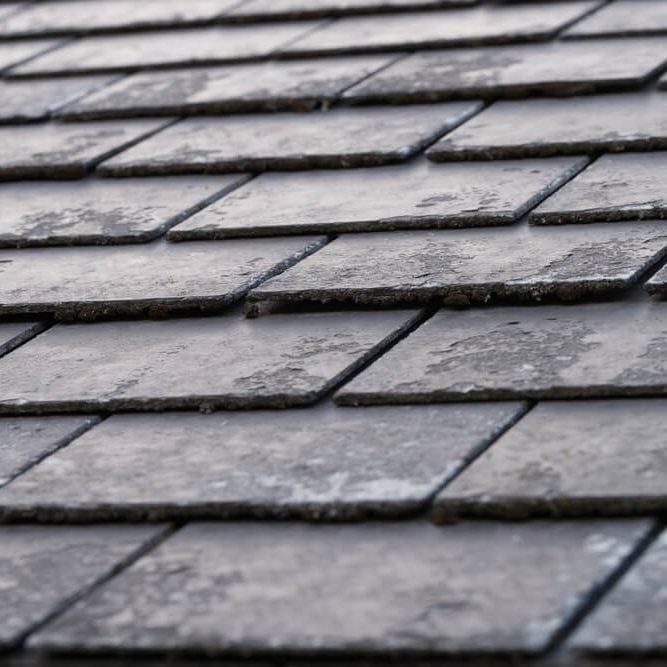
Supporting a Mast Beneath the Roof
The service mast must be p l umb (not leaning) and properly attached to the frame of the home by installing securely fastened metal conduit straps every iii -feet . Malleable pipe straps and iv-inch lag screws in studs may sometimes be substituted. T here will be a raintight threaded conduit hub where the service mast enters the meridian of the meter socket enclosure .
11 / 12

The Meter
Electric utilities often require the meter to be mounted iv-feet to half-dozen-anxiety from the ground , which is a reasonable height for utility workers to do their job in a safe style . Meter bases for the sockets are furnished at no toll in most areas .

12 / 12
Underground ability lines
Utility companies install electrical distribution either below basis or to a higher place ground , and they make the decision on which i volition exist used in your installation. The long-term overall cost is less for overhead electrical distribution compared to underground distribution , just sometimes the utility will install secret distribution , but it comes with an additional installation and maintenance cost to the belongings owner. T he location of the electric meter will be determined by the electric utility based on the size of the service, the type of service and the type of distribution equipment, such as a transformer or distribution pedestal .
Safety
Utility companies are very strict when information technology comes to breaking seals or removing meters . In improver to the obvious safety hazards, liability and theft of electricity are major concerns for utility companies. Always consult with the utility company before accessing the interior of the meter socket enclosure or attempt repairs to a service mast.
Near the author
Lisa Archer, Owner of BPG/Memphis Inspections Service & Nationwide Pest Control
901-826-7500
www.memphisinspections.com
Find out more than about Xcel'south requirements here
Can Service Entrance Cable Be Just Attach Right To The Side Of The House,
Source: https://www.familyhandyman.com/list/what-you-need-to-know-about-electrical-service-masts/
Posted by: hughesmorst1955.blogspot.com


0 Response to "Can Service Entrance Cable Be Just Attach Right To The Side Of The House"
Post a Comment